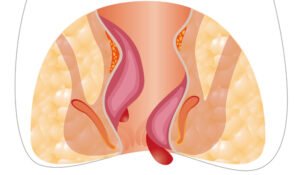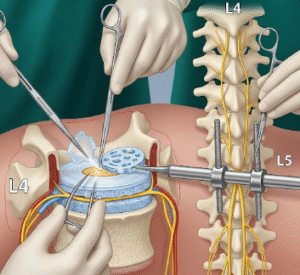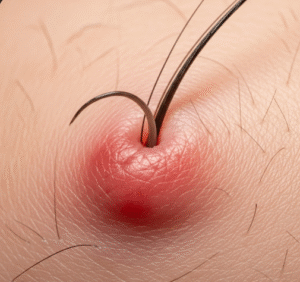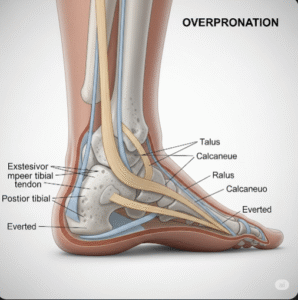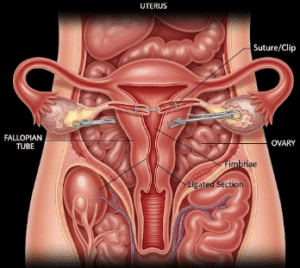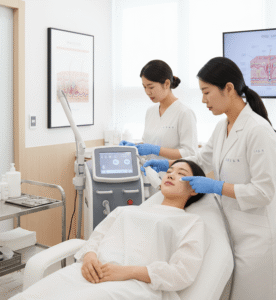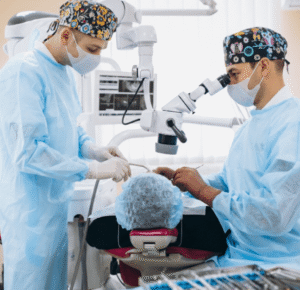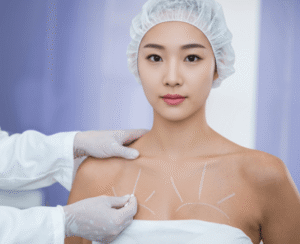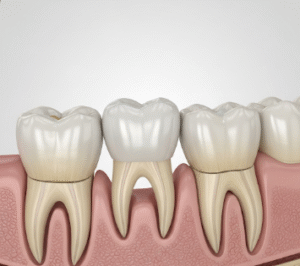Overview
Hirsutism is a condition characterized by excessive, unwanted hair growth in women in areas where men typically grow hair, such as the face, chest, and back. It is often caused by hormonal imbalances, particularly an increase in androgens (male hormones) in females. While hirsutism itself is not life-threatening, it can affect self-esteem, emotional well-being, and may indicate underlying medical issues.
In South Korea, dermatology and endocrinology clinics provide comprehensive evaluation, hormonal testing, laser hair removal, medical therapy, and counseling to effectively manage hirsutism and improve quality of life.
Key Facts
🟢 ➤ Hirsutism affects approximately 5–10% of women of reproductive age.
🟢 ➤ Commonly appears on the face (upper lip, chin), chest, abdomen, back, and arms.
🟢 ➤ Can be caused by polycystic ovary syndrome (PCOS), adrenal disorders, certain medications, or genetic factors.
🟢 ➤ Diagnosis involves clinical evaluation, hormonal testing, and sometimes imaging studies.
🟢 ➤ Treatments include lifestyle modifications, medications to reduce androgen levels, and cosmetic hair removal techniques.
🟢 ➤ South Korean clinics provide modern solutions such as laser therapy and individualized treatment plans for long-term results.
What is Hirsutism?
Hirsutism refers to excessive terminal hair growth in women following a male-pattern distribution.
➤ It is different from hypertrichosis, which is generalized excessive hair growth unrelated to hormonal imbalance.
➤ Severity can be assessed using the Ferriman-Gallwey score, which evaluates hair growth in nine specific body areas.
➤ Hirsutism may develop gradually during adolescence or adulthood, and sudden onset may indicate endocrine disorders or medication effects.
Symptoms Related to Hirsutism
Hirsutism primarily presents as visible excess hair, but other symptoms may indicate underlying causes:
🟢 ➤ Dark, coarse, or thick hair on the upper lip, chin, chest, abdomen, back, or arms.
🟢 ➤ Irregular menstrual periods, acne, or oily skin if caused by hormonal imbalance.
🟢 ➤ Deepening of the voice or increased muscle mass in severe androgen excess.
🟢 ➤ Emotional distress, embarrassment, or decreased self-esteem.
🟢 ➤ In some cases, symptoms of underlying disorders such as insulin resistance, obesity, or adrenal disease.
Causes / Possible Causes
Hirsutism is commonly associated with hormonal imbalance, particularly increased androgen levels:
Polycystic Ovary Syndrome (PCOS)
➤ The most common cause of hirsutism, associated with irregular periods, ovarian cysts, insulin resistance, and weight gain.
Adrenal Disorders
➤ Congenital adrenal hyperplasia, Cushing’s syndrome, or adrenal tumors leading to excess androgen production.
Medications
➤ Certain drugs, including steroids, danazol, or some anti-seizure medications, may trigger hirsutism.
Genetic and Ethnic Factors
➤ Some women have naturally higher androgen levels due to family history or ethnic predisposition.
Other Endocrine Disorders
➤ Hypothyroidism, hyperprolactinemia, or insulin resistance can contribute to abnormal hair growth.
When Should I See a Doctor?
Medical evaluation is important if:
🟢 ➤ Excessive hair growth appears suddenly or rapidly.
🟢 ➤ Accompanied by other signs of virilization (deep voice, increased muscle mass, or male-pattern baldness).
🟢 ➤ Menstrual irregularities, severe acne, or weight changes occur.
🟢 ➤ Emotional distress due to cosmetic concerns affects daily life.
🟢 ➤ There is a family history of endocrine disorders or metabolic syndromes.
Early consultation helps identify underlying causes, manage symptoms, and prevent complications such as insulin resistance or hormonal imbalance.
Care and Treatment
Management of hirsutism depends on cause, severity, and patient preferences:
Lifestyle and Home Measures
➤ Maintain a healthy weight and exercise regularly, which may help reduce androgen levels in PCOS.
➤ Avoid hair-removal techniques that irritate the skin, such as frequent shaving or harsh chemical depilatories.
Medical Treatments
➤ Oral contraceptives to regulate hormones and reduce androgen production.
➤ Anti-androgen medications such as spironolactone or finasteride.
➤ Topical treatments like eflornithine cream to slow facial hair growth.
Cosmetic and Procedural Treatments
➤ Laser hair removal: Effective for long-term reduction of coarse hair.
➤ Electrolysis: Permanent hair removal option for localized areas.
➤ Waxing or threading for temporary cosmetic control.
Advanced Care in Korea
➤ South Korean dermatology and endocrinology clinics provide personalized treatment plans combining hormone therapy, laser hair removal, and lifestyle counseling.
➤ Multidisciplinary teams ensure safe management of underlying conditions, long-term monitoring, and cosmetic outcomes.
➤ Patients receive education on triggers, hormone regulation, and realistic expectations for hair reduction.
Highlights (Clean Green Arrow Version)
🟢 ➤ Hirsutism is excessive hair growth in women in male-pattern areas, often caused by androgen excess.
🟢 ➤ Symptoms: dark, coarse hair on face, chest, back, or arms; irregular periods; acne; emotional distress.
🟢 ➤ Causes: PCOS, adrenal disorders, medications, genetic factors, or other endocrine disorders.
🟢 ➤ Seek medical care for sudden hair growth, virilization symptoms, or menstrual irregularities.
🟢 ➤ Treatments include lifestyle changes, hormonal therapy, anti-androgen medications, laser hair removal, and cosmetic procedures.
🟢 ➤ South Korea offers advanced dermatology and endocrinology care, including laser hair removal, medical therapy, and personalized treatment plans for hirsutism.


